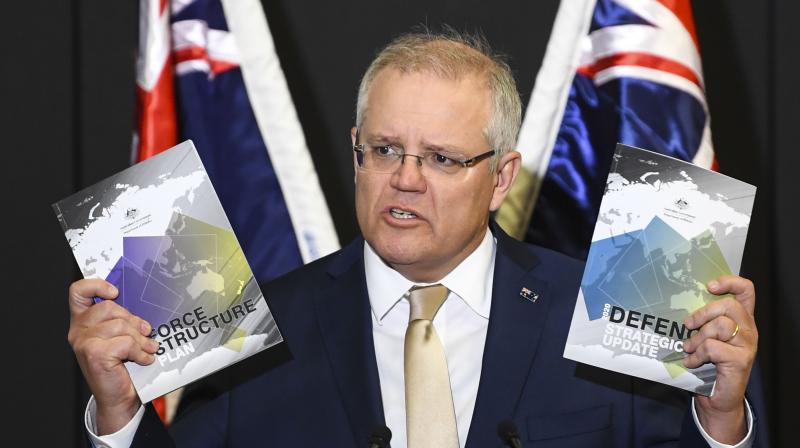Australia escalates defences amid growing tensions with China
01 July, 2020

Australia announced an assertive new defence strategy Wednesday, beefing up its long-range strike capacities and cyber-warfare efforts amid escalating tensions with China.
Primary Minister Scott Morrison earmarked Aus$270 billion ($185 billion) for latest and upgraded defence capacities over another decade -- a almost 40 percent rise -- saying the defence push would considerably shift its focus to projecting military electric power across the Indo-Pacific.
"We must encounter the reality that we have moved right into a new and much less benign strategic era," Morrison stated in a major coverage speech, eyeing the finish of unquestioned US hegemony and the surge of an increasingly assertive China.
"Once we stare straight down the COVID pandemic in the home, we must also plan a post-COVID world that is poorer, that is more threatening and that's more disorderly."
Australia's government has committed to spending at least two percent of GDP on defence -- as US President Donald Trump features angrily demanded of allies -- and plans to invest almost 40 percent more on weapons systems during the last defence review in 2016.
The country will get a better strike capability that can hit targets a large number of kilometres from Australia, you start with the United States' AGM-158C Long Range Anti-Ship Missile.
It will also spend money on newer platforms want drones, and boost exploration into hypersonic and direct strength weapons like lasers.
Middle power
While acknowledging the nation of 25 million persons cannot meet its rivals in your community -- China officially ideas to invest $178 billion on defence in 2020 alone -- Morrison framed Australia as a regional electricity focused on an "start, sovereign Indo-Pacific, clear of coercion and hegemony".
Though Morrison said Australia remains prepared to send troops further afield "where it is inside our national interest to take action", he underscored that could come at the price tag on the country's capability to react to threats from and in its backyard.
Australia has fought alongside the United States in every major battle of the last century, often in areas definately not its shores.
The announcement marks a substantial shift in Australia's defence posture and you will be widely seen as an attempt to counter Beijing's growing influence in the region.
Within the strategic pivot, the Australian Defence Force will give attention to building "stronger deterrence capabilities" to improve the cost for any would-be aggressor and concentrate on the immediate region over operations further more afield, he said.
In addition, it follows Morrison's "Pacific Step-Up" policy -- announced found in 2018 to rebuild support among regional allies drifting toward Beijing -- which includes seen his government crank up diplomatic engagement and provide greater financial aid to its growing neighbours.
"We want a region where all countries, large and small, can engage freely with one another, guided by international rules and norms," he stated Wednesday.
Morrison said Australia would drastically increase investment found in defence space features -- including a good network of satellites to create an independent communications network -- calling it a "totally new theatre" for the united states, which recently launched its space agency.
He likewise pinpointed cybersecurity as major to Australia's defence strategy, a time after announcing the "largest-ever" raise in cybersecurity spending -- a roughly 10 percent hike that uses the budget for another decade to Aus$15 billion.
The federal government says Australia has been targeted in a wave of state-sponsored attacks, which are suspected to have already been completed by China.
Beijing has clashed repeatedly with Canberra since it looks to improve the expense for Australia of speaking out against Communist Get together interests.
Lately, Australia enraged China by calling for a study in to the origins of the coronavirus pandemic.
Canberra has also pushed rear against what it describes seeing that China's economical "coercion", covert influence campaigns and the utilization of technology companies like Huawei as an instrument for intelligence-gathering and geopolitical leverage.
China features warned its pupils and tourists against likely to Australia, slapped trade sanctions on Australian products and sentenced an Australian citizen to death for drug trafficking.
Source:
